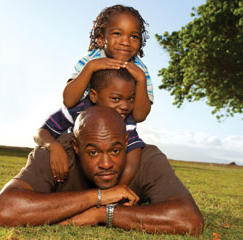 Today's fathers want to be more involved with their babies than their own fathers were, and their involvement can play a critical role in a child's future. That's the message delivered by John Gottman Ph.D., professor of psychology at the University of Washington, and co-founder of the Gottman Institute, to those attending a recent Dads Breakfast sponsored by PEPS (Program for Early Parenthood Support).
Today's fathers want to be more involved with their babies than their own fathers were, and their involvement can play a critical role in a child's future. That's the message delivered by John Gottman Ph.D., professor of psychology at the University of Washington, and co-founder of the Gottman Institute, to those attending a recent Dads Breakfast sponsored by PEPS (Program for Early Parenthood Support).
"Study after study after study is showing that father involvement and warmth and emotional availability to young children predict intellectual functioning and emotional functioning in both sons and daughters," Gottman told the group.
Dads inherently tend to interact differently with their children, Gottman says. On the playground, for instance, moms tend to voice concern as their children climb higher on the jungle gym, while the dads tend to encourage them to keep going. At home, moms typically take on a teacher type of role as their children grow, while dads often act more as peers or playmates. Moms tend to play more visual games with their children, while dads are far more likely to engage in high-energy play such as tickle fights and roughhousing. Dads are also more likely than moms to abandon a game the child does not find immediately interesting.
These differences play very important roles in child development. For example, Gottman says, "People find that the physical rough-and-tumble play that dads engage in with infants predicts the ability of the infants to control their own impulses."
According to Gottman, the significance of impulse control was demonstrated through research first conducted by Walter Mischel during the 1960s. In Mischel's study, preschoolers were offered the choice between receiving one marshmallow immediately or two marshmallows in 20 minutes. Mischel later tracked down the study participants as young adults and tested them again. He found that those who were able to delay gratification as preschoolers were more socially competent, personally effective, self-assertive adults who were better able to cope with frustration, were more self-reliant and confident, and less likely to crumble under stress. They embraced challenges and pursued them without getting sidetracked by difficulties.
Even more remarkable, those who were able to wait for the marshmallows when they were in preschool scored on average 200 points higher on the SAT than those who couldn't wait. The results were true for both boys and girls. Other studies have shown that the high-energy play that dads engage in is one of the best predictors for how kids get along with other kids, which is itself one of the best predictors of adult development, much more so than things like IQ scores or GPA.
 One of the keys to father involvement, Gottman concludes, is the quality of the relationship between parents and whether conflict is dealt with in a constructive manner. It's difficult to be warm and emotionally available when the relationship between the parents is strained. When there's a lot of conflict between parents, fathers withdraw not only from their partner, but from their infants as well, Gottman adds.
One of the keys to father involvement, Gottman concludes, is the quality of the relationship between parents and whether conflict is dealt with in a constructive manner. It's difficult to be warm and emotionally available when the relationship between the parents is strained. When there's a lot of conflict between parents, fathers withdraw not only from their partner, but from their infants as well, Gottman adds.
Research has shown that, during a process called social referencing, "Babies will look at their moms when they approach something dangerous to see if it's OK to proceed, and their happily married dads," Gottman says, "but they no longer look back at their unhappily married fathers."
The benefits of how dads play with their kids may be most effective in younger children, although Gottman notes that there has not been enough research in this area. At the same time, he suspects that the benefits of emotion coaching can be effective for essentially any age child, from infants to adolescents.
With this in mind, Gottman offers some advice for how parents, and dads in particular, can try to offer more of the paternal warmth and emotional availability that seems to make such a difference for children down the road:
Create "love maps." Make a point of knowing your child's interests, stresses and dreams, Gottman says. Ask your children open-ended questions and actively listen to the answers. If you don't know what your child is currently studying in school, or what his or her favorite subjects or hobbies are, this is an area to focus on.
Work toward a daily climate of respect and affection. "Catch" your children and your partner doing things right and let them know it. Avoid a constantly critical state of mind. If you find yourself always wanting to offer advice, try praise instead.
Stay involved. Fathers should cultivate time alone with their children. It doesn't need to be elaborate outings. Regular everyday activities, like bath time, changing diapers and reading, are the secret to making paternal involvement part of your routine.
Turn toward bids for emotional connection, whether from your partner or your child. If one of them says he or she needs to talk, say, "OK, let's talk." Move from "me" to "we." Couples where the members think of themselves as partners have a much better chance of providing an atmosphere that will encourage paternal warmth and availability, Gottman notes.
Josh Parks is a Seattle-based freelance writer and editor and father of two. He also regularly contributes articles on fantasy baseball for baseballnotebook.com










